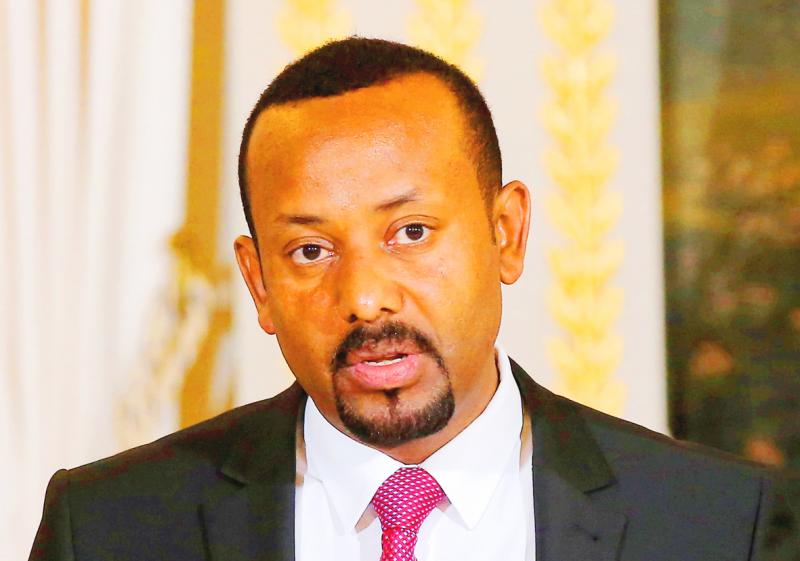Survivors of a massacre by rebels in western Ethiopia on Sunday counted 54 bodies in a schoolyard, the latest attack in which members of ethnic minorities have been deliberately targeted, Amnesty International said on Monday.
Human rights groups are asking why federal soldiers left the area just hours before attackers moved in and targeted ethnic Amharas.
Ethiopian Prime Minister Abiy Ahmed denounced the killing of people based on identity, adding that security forces had been deployed to the area and “started taking measures.”

Photo: Reuters
Ethnic violence in Ethiopia is posing the greatest challenge yet to the prime minister, who was last year’s Nobel Peace Prize winner for his sweeping political reforms.
“Ethiopia’s enemies are vowing either to rule the country or ruin it, and they are doing everything they can to achieve this,” Abiy said in a Facebook post. “One of their tactics is to arm civilians and carry out barbaric attacks based on identity. [For me] this is heartbreaking.”
Ethiopia’s government blamed a rebel group, the Oromo Liberation Army (OLA), for the attacks in the far western part of Oromia, in an area bordering South Sudan and a few hundred kilometers from the capital, Addis Ababa.
The head of the Oromia region police commission, Ararsa Merdasa, told the state broadcaster the death toll was 32 and “some 200 families have fled the area.”
Survivors of the attack in Guliso District of West Wellega Zone told Amnesty that federal troops had withdrawn unexpectedly and the rebels arrived hours later, identifying themselves as the OLA and announcing that they now controlled the area.
“Militants gathered people who did not manage to flee, mainly women, children and the elderly, and killed them,” Amnesty said.
Survivors hid in a forest nearby. One told the human rights group he found the bodies of his brother, sister-in-law and three children in the schoolyard with bullet wounds.
“The fact that this horrendous incident occurred shortly after government troops abruptly withdrew from the area in unexplained circumstances raises questions that must be answered,” Amnesty regional director Deprose Muchena said.
The Ethiopian Human Rights Commission said the preliminary evidence it obtained indicated that the number is likely to exceed the government’s tally of 32, while sources said the attackers numbered up to 60.
Ethnic Amharas “were dragged from their homes and taken to a school, where they were killed.”
The commission urged the federal government to “shed light on the reasons behind the military’s withdrawal from an area long known to be vulnerable to attacks” and to make sure civilians are protected.
Amharas are the second-most populous ethnic group in Ethiopia after Oromos. They also have been targeted by gunmen in the Western Benishangul Gumuz and Southern regions in recent weeks, leaving several dozen dead.
Oromia region spokesman Getachew Balcha said Sunday’s attack was aimed at creating havoc and putting psychological pressure on citizens.
“The government has failed in its duty to protect the safety of citizens,” said Dessalegn Chanie, a senior member of the opposition National Movement of Amhara party, adding that Ethiopia’s language-based federal system is the main cause for the killings.
“Ethnic Amharas residing outside of the Amhara region are being labeled as outsiders and are exposed to repeated attacks,” he said.
Under the system, Afan Oromo speakers generally live in Oromia, Amharic speakers generally live in the Amhara region and so on. The structure gives locals more say in local affairs.

BRUSHED OFF: An ambassador to Australia previously said that Beijing does not see a reason to apologize for its naval exercises and military maneuvers in international areas China set off alarm bells in New Zealand when it dispatched powerful warships on unprecedented missions in the South Pacific without explanation, military documents showed. Beijing has spent years expanding its reach in the southern Pacific Ocean, courting island nations with new hospitals, freshly paved roads and generous offers of climate aid. However, these diplomatic efforts have increasingly been accompanied by more overt displays of military power. Three Chinese warships sailed the Tasman Sea between Australia and New Zealand in February, the first time such a task group had been sighted in those waters. “We have never seen vessels with this capability

A Japanese city would urge all smartphone users to limit screen time to two hours a day outside work or school under a proposed ordinance that includes no penalties. The limit — which would be recommended for all residents in Toyoake City — would not be binding and there would be no penalties incurred for higher usage, the draft ordinance showed. The proposal aims “to prevent excessive use of devices causing physical and mental health issues... including sleep problems,” Mayor Masafumi Koki said yesterday. The draft urges elementary-school students to avoid smartphones after 9pm, and junior-high students and older are advised not

Philippine President Ferdinand Marcos Jr has fired his national police chief, who gained attention for leading the separate arrests of former Philippine president Rodrigo Duterte on orders of the International Criminal Court and televangelist Apollo Carreon Quiboloy, who is on the FBI’s most-wanted list for alleged child sex trafficking. Philippine Executive Secretary Lucas Bersamin did not cite a reason for the removal of General Nicolas Torre as head of the 232,000-member national police force, a position he was appointed to by Marcos in May and which he would have held until 2027. He was replaced by another senior police general, Jose

POWER CONFLICT: The US president threatened to deploy National Guards in Baltimore. US media reports said he is also planning to station troops in Chicago US President Donald Trump on Sunday threatened to deploy National Guard troops to yet another Democratic stronghold, the Maryland city of Baltimore, as he seeks to expand his crackdown on crime and immigration. The Republican’s latest online rant about an “out of control, crime-ridden” city comes as Democratic state leaders — including Maryland Governor Wes Moore — line up to berate Trump on a high-profile political stage. Trump this month deployed the National Guard to the streets of Washington, in a widely criticized show of force the president said amounts to a federal takeover of US capital policing. The Guard began carrying